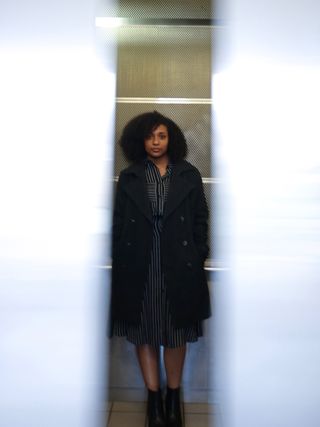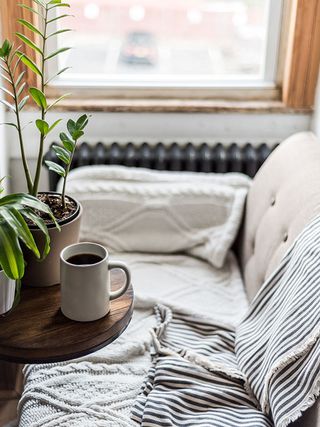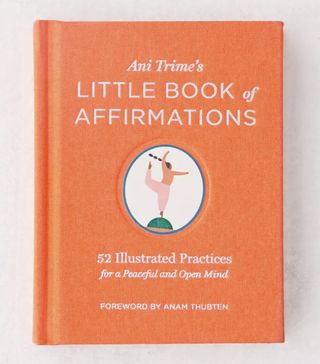I Struggle With Social Anxiety—Here's What I've Learned from Therapists

For most people who know me, they think that I'm this extroverted human being who thrives on human interaction but the truth is, that's the last way I would describe myself. Growing up, I was an outsider then, and sadly, I still feel like one till this day. Consider me an awkward mix of Issa on Insecure, Josie Geller from Never Been Kissed, and Vada Sultenfuss from My Girl. A part of who I am has always felt disconnected from the world and withdrawn completely from society. There are about three places on earth where I feel like my complete self, and that’s when I'm with my grandmother and mom, at the beach, and when I'm writing in my journal. Those are the only three things in life that I truly trust with my soul.
I have never fit in anywhere—not at any job, school, or even around my so-called friends. My family even jokes and says, "Oh, Kia, you're always in your own little world," and the truth is, I am. I hate all of the things that people my age love: parties, clubs, festivals, and anything that makes me feel like the world is judging me.

As we're coming up on the end of the year, I have noticed that my calendar is filling up with events like holiday parties and just general get-togethers. Like the overlypleasing person that I am, I RSVPed yes to everything with hopes that my crippling thoughts would fade while I'm in the presence of others. Well, it turns out I thought that by changing who I truly am on the inside—which is a very awkward girl—that I would be accepted by the world when in reality, it just created a never-ending battle with who I am versus who people perceive me to be.
Every event I've gone to in the past year that involved more than 10 people left me feeling so sad, frustrated, and downright defeated. I constantly felt like I was saying the wrong thing or too much. The more people in the room with me, the lonelier I felt. These feelings left me with a conundrum that I couldn't solve.
A couple of weekends ago, I went to a party, and that's when my symptoms started again. Someone asked me to dance, and I completely clammed up and ran out of the party to the backyard. The voices in my head seem to come at me all at once, reminding me that everyone in the room was judging me, everyone there hated me, I looked dumb, off-beat, and that I was completely different from everyone there who was normal and having so much fun. A few weeks before that, I went to a day party for my birthday and I'd never felt more invisible. It completely triggered me and it reminded me that these feelings will never go away unless I face them. I told my mom about what I was feeling and she suggested that I might have social anxiety. As I did research, I realized that I've been suffering from this my whole life and it's gone untreated. I remember being in middle school and crying to my grandmother about how I didn't fit in with anyone at school and she assured me that I was special. Well, that was 15 years ago, and I'm not sure if I feel any different now.

Since the holidays are here, I decided to connect with Laura Geftman, LCSW, a mental health consultant for Lina, and Crystal Burwell, PhD, LPC, CPCS, BC-TMH, the Director of Outpatient Services at Newport Healthcare Atlanta for some tips and facts surrounding social anxiety and how to manage it. Please note that if you are experiencing something similar, these tips can help, but it's best if you also reach out to an expert for help with your specific situation. SAMHSA can be a good place to start: Just call 1-800-662-HELP (4357) or visit the website.
What Is Social Anxiety?

Geftman says that we often mislabel social anxiety. "Social anxiety is very confusing. We often mistake it as being shy, being awkward or just stress. We attach that to what is a mental health disorder. It's really a matter of looking at it as a pervasive problem that gets in a person's way on how to engage in social settings from a holiday party, dating, or meeting new people. There's ways that social anxiety can prevent you from engaging with the world. For some people, it's really hindering."
Oftentimes, when I get these voices in my head reinforcing the negative thoughts I question if these negative feelings and emotions are stemming from trauma. I've been an oddball my entire life but I can't solely blame my social anxiety on that, I think. Burwell believes that trauma plays a part. "It depends on the person and how they interpret the trauma and how they may make meaning out of the trauma. Almost everything is rooted in trauma," she says. "Our brain doesn't know the difference between being on the frontline in Afghanistan or just being anxious about a test. It's the same neurotransmitters in our brain that make our voice crack. Our body doesn't differentiate. The thoughts that may come up may mitigate. Trauma is a huge event."
What's the Difference Between Social Anxiety and Depression?

After years of not being able to recognize and put a name to what I was feeling, I just thought I was depressed. I know I can't be the only one who has a hard time differentiating between depression and crippling anxiety. Burwell believes depression and social anxiety are not the same things but that they definitely intertwine.
"Anxiety and depression are cousins because they're in the same position of your brain. People that are depressed may have some anxiety to various degrees. There are different anxiety disorders. There's generalized anxiety," Burwell says. "Sometimes the symptoms may bleed together. I always encourage anyone to set up an appointment with a therapist because that can be transformative and it can give you answers."
How Can I Explain My Social Anxiety to Friends and Family?

Telling loved ones that you are struggling can bring up a lot of emotions. For me, it's been a huge fear to admit that I have issues that I just end up going "ghost" and distancing myself, which in turn has made my relationships with people worse. Burwell advised me to be transparent with my friends and family.
"Everybody has some social anxiety. Sometimes sharing it with a friend could be a release and it sparks a conversation," Burwell says. "There are levels of social anxiety. You will always carry that anxiety with you and typically, it will intensify. When you find yourself in these situations, ask yourself, 'What about this is triggering? Have I had situations in the past where this came up?'" One script that I tell myself is, "What opportunity could I be missing out on?"
Just because you are aware of something, it doesn't mean that it's translating on the outside. Geftman suggests finding a language that you're comfortable with to communicate when your anxiety is too much to bear. It's important to explain that something is giving you a certain reaction. Maybe it's a safeword, maybe it's a tug on the shoulder. Before you put yourself in a situation, plan ahead. Maybe even write something down or send a text message, Geftman says.
How Can You Avoid Those Negative Crippling Thoughts in Social Settings?

One of the things about my social anxiety that seems to be uncontrollable are my thoughts. Sometimes they get so bad when I'm out that it makes me want to disappear. Burwell gave me a few tips on what to do when the voices in my head get too overwhelming.
"Think of a positive alternative thought to counter each negative one. Have little coping skills already planned? Focus on small victories. Gradually confront your fears," Burwell says. "The more you're exposed to something, your brain can always re-route. Have more exposure to social settings in small increments."
How to Get Through the Holidays With Social Anxiety

One thing that I've had to learn about the holidays is that they're not exactly like the movies and everyone doesn't always have a happy season. Geftman shared some tips about how to get through the "happiest" time of year.
"The first thing that I advise people to do is get realistic about it. There's such a fantasy element to the holidays," she says. "Be realistic/break it down and be honest. Peel back the layers of the fantasy on what it should look like. It helps manage your anxiety. When it comes to social anxiety, that can be impacted by a number of different aspects. It may be impacted by other overwhelming feelings like depression, sadness, grief, or loss. It's important to recognize that and find a way to honor your feelings of sadness and grief. It can be marked by traditions. It's a time where we take inventory."
Next: This Is How Therapists Help Their Patients Practice Self-Love
Disclaimer
This article is provided for informational purposes only and is not intended to be used in the place of advice of your physician or other medical professionals. You should always consult with your doctor or healthcare provider first with any health-related questions.
-
 I Live for Yoga and Pilates—These Are the Pieces That Help My Flow
I Live for Yoga and Pilates—These Are the Pieces That Help My FlowTake notes.
By Humaa Hussain
-
 It's Time to Get Our Nutrition in Check for Summer—This App Is Making It Easy
It's Time to Get Our Nutrition in Check for Summer—This App Is Making It EasyThe recipe ideas are endless.
By Who What Wear
-
 This Founder Shares Why We Should Start Celebrating Rest
This Founder Shares Why We Should Start Celebrating RestBurnout is nothing to be proud of.
By Kia Topps
-
 If You're Battling With Digestive Issues, This Could Be Why
If You're Battling With Digestive Issues, This Could Be WhyTurns out, you may not have IBS after all.
By Kia Topps
-
 Our Editors Own a Lot of Sneakers, But This Pair Comes in First Place Every Time
Our Editors Own a Lot of Sneakers, But This Pair Comes in First Place Every TimeA major win.
By Aniyah Morinia
-
 Why Dr. Deepika Chopra Believes that Optimism is Resiliency
Why Dr. Deepika Chopra Believes that Optimism is ResiliencyWhy you should start embracing every feeling.
By Kia Topps
-
 How TikTok's Favorite Photographer Helped Me Find My Confidence
How TikTok's Favorite Photographer Helped Me Find My ConfidenceI renewed my relationship with myself.
By MacKenzie Green
-
 I Changed My Mind About Strength Training When I Tried This Workout
I Changed My Mind About Strength Training When I Tried This WorkoutMy confidence is officially on 10.
By Kia Topps



